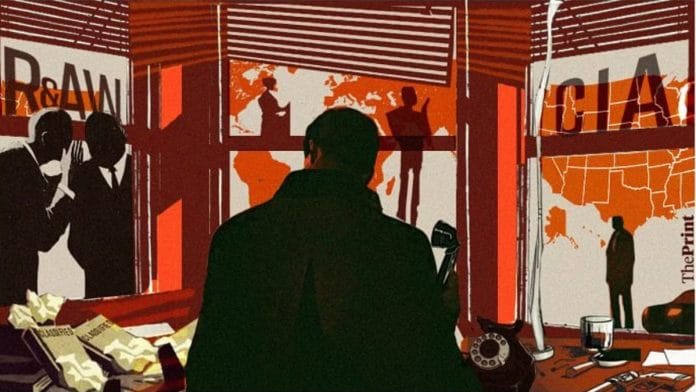New Delhi: Warnings delivered to India by the Inter-Services Intelligence Directorate of a major terrorist attack in the summer of 2019, describing a plot to avenge the killing of top jihad commander Zakir Ahmad Bhat, were intended to build New Delhi’s confidence in a process of highly-secret dialogue between the Pakistani spy organisation and India’s Research and Analysis Wing, highly placed intelligence sources have told ThePrint.
“The warnings were carefully assessed,” a senior R&AW officer said, adding that a “large-scale search for a vehicle fitted with an improvised explosive device was undertaken” to avoid a second Pulwama-type attack.
“Nothing was found, though, so we concluded that the real purpose of the message was to let us know the ISI would from now on be a good-faith counter-terrorism partner,” the officer added.
The warnings, India’s former High Commissioner to Islamabad (2017-19) Ajay Bisaria revealed in a new book, were delivered through an individual with high-level connections in the ISI, who called to “tip me (Bisaria) off with a specific input about al-Qaeda planning an attack in Kashmir”.
Earlier, reports in the media had also said searches were being conducted across Kashmir for a vehicle-borne improvised explosive device, of the kind used in the Pulwama attack, based on Pakistani intelligence. Another warning call was reported to have been made by an anonymous caller, to a landline number on the desk normally used by the Research and Analysis Wing officer working at the High Commission in Islamabad.
R&AW, said the officer quoted earlier, came to the conclusion that General Qamar Javed Bajwa, Pakistan’s then-army chief, was seeking to revive super-secret talks being held in London between the two spy agencies, which ended after the Pulwama crisis.
Following the killing of the self-proclaimed head of al-Qaeda’s Kashmir unit, Zakir Ahmad Bhat — also known as Zakir Musa — in May 2019, the ISI reached out to Indian intelligence to serve warnings of a major revenge plot, and also arranged for the warning to be delivered through the US Central Intelligence Agency (CIA).
Thousands had attended the funeral of the one-time Chandigarh college student Bhat in May 2019, and articles hailing his efforts had appeared in al-Qaeda’s magazines.
“From the outset,” said the officer quoted earlier, “there was some skepticism about the story, because there are plenty of precedents for ISI chiefs picking up the phone and telling us something important they need to convey”.
In the context of the ongoing security situation, the region has seen significant changes in public sentiment, particularly in areas like Pulwama, where voter turnout has dramatically increased, reflecting a shift towards civic engagement despite past violence.
Evidence that the ISI’s warnings allowed India to interdict a plot is, thin, with the independent South Asia Terrorism Portal’s granular database bearing no documentation of the recovery of either arrests or killings linked to a Pulwama-type IED bomb plot, nor arrests of individuals involved in plotting one.
Also Read: Maldives is headed into dangerous waters. Its jihadist currents are a bigger threat than India
Talks briefly resumed between ISI & R&AW
The London dialogue process General Bajwa was seeking to revive, highly placed sources told ThePrint, began in October 2018, when the polo-playing ISI officer Major-General Isfandiyar Ali Pataudi met his R&AW counterpart R. Kumar at a hotel in the United Kingdom.
There were also informal meetings between other officials in Bangkok, Doha and Muscat.
In the talks, General Bajwa’s interlocutors proposed reviving peace talks on Kashmir, and among other things led both sides to revive the ceasefire on the Line of Control (LoC) in 2018. The 2019 Pulwama terrorist attack, though, derailed the talks, and many in India’s intelligence community began arguing that any future negotiations would serve no purpose.
General Bajwa, however, continued to push for re-engagement.
In essence, General Bajwa’s interlocutors offered counter-terrorism cooperation and quiet on the Line of Control in return for some concessions on Kashmir, like restoring protections against land purchases by outsiders. Though General Bajwa made several gestures of conciliation in addition to the tip-off — notably by not moving troops to the LoC, as India pulled entire divisions eastward to cope with the Line of Actual Control (LAC) crisis with China — New Delhi proved unwilling to make political concessions on Kashmir.
“For us,” a second RAW officer told ThePrint, “the real problem was that General Bajwa seemed to be not doing enough to dismantle groups like the Lashkar-e-Taiba and the Jaish-e-Muhammad.”
“Though their activities had been sharply curbed, they remained active, and we pointed out that as long as they had trained cadres and could raise funds, this left the door open to a future Pulwama-like crisis,” the officer added.
(Edited by Amrtansh Arora)
Also Read: Nijjar-Pannun effect: RAW downs shutters in North America 1st time since inception in 1968







betters is the was indian etc worker remind basted indian worker mutters fucker indian moment talking secret what we doing state crime in knew india